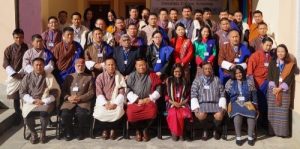Sonipat, Haryana, India: Experts called for universal access to health care, substantial augmentation of human resources in the medical field, increasing access to drugs and vaccines, low-cost indigenous solutions and integration of alternative systems of medicine to enable India to overcome a number of serious challenges in realizing the right to health.
At the International Conference on Healthcare organised by O. P. Jindal Global University in collaboration with Harvard Global Health Institute and the Harvard T.H. Chan School of Public Health, several speakers emphasized that universal access to healthcare must be the focus of our efforts rather than universal health coverage through insurance.
“18 percent rural population in the country has no access to healthcare,” said Rakesh Kumar, Joint Secretary, Ministry of Health and Family Welfare at the inauguration of ‘Delivering on the Promise of Universal Health Coverage in India: Policy Options and Challenges’.
According to Kumar, the burden of non-communicable diseases in the country has increased. “Seventy percent of deaths in India will be caused by non-communicable diseases by 2020.”
Delivering the welcome address, Professor C Raj Kumar, Founding Vice-Chancellor, O. P. Jindal Global University said, “Today’s conference is the culmination of an institutional collaboration between Jindal Global University, Harvard Global Health Initiative and the Harvard School of Public Health to examine legal, policy and regulatory issues relating to the universal health coverage in India. It brought together academics, policy makers, doctors, lawyers, public health practitioners, NGOs and government representatives to discuss and debate a central issue of public policy, which is about the efforts to achieve universal health coverage in India.”
Emphasizing on the right to health as a constitutional promise Professor Kumar further added, “The need for achieving universal health coverage with a view to fulfilling the right to health in India is not only a public health issue. It is about fulfilling the democratic aspirations of Indian citizenry and achieving good governance; it is about seeking equality and non- discrimination in implementing public policy; and most importantly, it is about ensuring justice and fulfilling the constitutional promise.”
“There is an imperative need to raise the level of funding for health care programs in the country”, said Dr. Peter Berman, Prof of the Practice of Global Health Systems and Economics, Harvard T. H. Chan School Public Health (HSPH), while speaking on the financing promises, commitments, and performance of government-driven health care programs of the past ten years.
“There has always been a high willingness on part of the government to allocate and spend money on health care, through programs like National Health Mission. The sole impediment in this direction is not willingness to spend money but the ability to spend it and allocating sufficient funds for such programmes is the only viable solution,” he added.
Explaining the impact of poor healthcare on the country, Ramanan Laxminarayan, Professor, Public Health Foundation of India, said, “India is “very different from other countries” where “people may go into financial impoverishment because of high primary healthcare cost”.”
Highlighting the state of medical education in India, Kesav Desiraju, Former Secretary, Department of Consumer Affairs and Former Secretary, Ministry of Health and Family Welfare, said the government has no interest in revising the curriculum of MBBS. “The problem is much deeper than we think at the undergraduate level,” he said.
Advocating an increased involvement of the private sector the universal health coverage plan, Mr. Rajeev Malhotra, Professor, Jindal School of Government and Public Policy & Chief Editor, India Public Policy Report, said, “The private sector has made significant investments in the health care sector in the last ten years and has been a major driver in creating infrastructure in the public goods and services sector.”
He further articulated how the density of hospital beds has increased in an incremental manner due to the contributions of the private sector, and concluded by saying that the sector had a definite role to play.
Quoting information released by the National Family Health Survey (NFHS), Dr. Y.S.R. Murthy, Professor and Registrar, JGU, said, “As per the latest statistics released by NFHS, over 34% of children under the age of five still suffer from malnutrition. This is a silent emergency and an extremely serious issue, which requires the urgent attention of the government.”
Other distinguished speakers at the conference included: Ms. Mallika Ahluwalia, Programme Officer, Bill & Melinda Gates Foundation, India Country Office, Dr. Ajay Mahal, Professor of Health System and Economics, University of Melbourne and Dr. Manoj Mohanan, Assistant Professor, Sanford School of Public Policy, Duke University.

